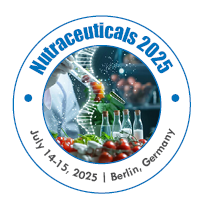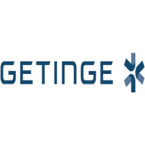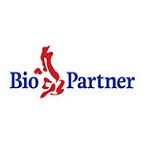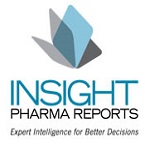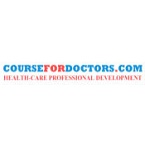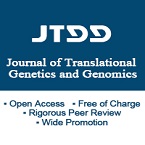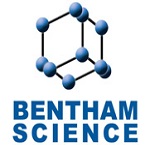About Conference
CONFERENCE SERIES is pleased to present a truly transformative experience for the scientific community. Our platform offers an exceptional opportunity to explore the latest breakthroughs and advancements in the world of Natural Medicines, Nutraceuticals, and Neurocognition. Whether you're a seasoned professional or a budding researcher, this is a prime event to learn, share, and engage in dynamic discussions. Join us for the 21st International Congress on Advances in Natural Medicines, Nutraceuticals & Neurocognition, taking place on July 14-15, 2025, in Berlin, Germany, under the theme:
The Future of Neuroscience: Harmonizing Nature with Medicine to Advance Brain Health
This prestigious two-day event will bring together leaders in science, research, and industry, with an agenda filled with stimulating symposiums, interactive workshops, and world-class keynote sessions. These sessions will be led by the most respected figures in the field, providing a rich opportunity for intellectual exchange and inspiration. In addition to the formal discussions, the conference will facilitate networking among the world’s top researchers, healthcare professionals, and industry experts. Participants will be able to connect, collaborate, and exchange ideas with some of the brightest minds driving innovations in the fields of neuroscience, natural medicines, nutraceuticals, and cognitive health.
Key Highlights of the Conference:
-
Enlightening Keynote Sessions: Gain valuable insights from thought leaders in neuroscience and natural medicines who are advancing the frontier of brain health, cognitive healing, and the application of nutraceuticals.
-
Symposiums and Workshops: Learn directly from established experts as they share their research findings, case studies, and cutting-edge treatments that are shaping the future of healthcare.
-
Global Networking: Engage with participants from across the globe, including top researchers, medical professionals, industry leaders, and academic scholars. This is an unparalleled chance to expand your network and foster collaborations that could lead to groundbreaking discoveries.
-
Opportunity for Researchers and Universities: Representatives from academic institutions, universities, and research centers will have the chance to explore new avenues for collaboration with global experts in the field. This is an excellent opportunity to partner on future research projects or discuss innovations in the development of natural medicines and cognitive therapies.
-
Business Growth and Market Expansion: For companies and entrepreneurs, this conference provides a unique opportunity to explore the growing market for nutraceuticals and functional foods. Learn about the latest consumer trends, regulatory frameworks, and potential opportunities for expanding your products and services on a global scale.
Theme Overview: The theme of the 21st International Congress, "The Future of Neuroscience: Harmonizing Nature with Medicine to Advance Brain Health and Cognitive Healing," emphasizes the importance of integrating natural solutions with medical advancements. Over the past decade, neuroscience has witnessed remarkable progress in understanding the brain, its functions, and its potential for healing. This conference will explore how natural substances, such as nutraceuticals and functional foods, can play a key role in enhancing cognitive function, supporting brain health, and even reversing cognitive decline. We will delve into the scientific mechanisms behind these treatments and examine how they can be incorporated into modern medical practices to create more holistic, effective solutions for brain health.
What Are Nutraceuticals?
Nutraceuticals are defined as food or food components that provide health benefits beyond their basic nutritional value, including the prevention, management, and treatment of diseases. These substances, while similar to dietary supplements, are considered to be an important addition to traditional medical therapies. Nutraceuticals include standardized nutrients that may have a wide range of benefits, such as promoting better brain function, enhancing memory, preventing neurodegenerative diseases, and even alleviating symptoms of stress and anxiety. These health-promoting substances are being integrated into diets to provide better nutrition and potentially beneficial effects beyond basic nutrition.
Nutraceuticals are not just supplements—they encompass functional foods like cereals, breads, beverages, and other fortified products that can aid in disease prevention, cognitive function, and overall wellness. Examples include probiotics, prebiotics, plant sterols, and the addition of vitamins or minerals to everyday food products. Functional foods are vital in preventing chronic diseases and supporting long-term health, which is why the conference will highlight their potential for future therapies in neurocognition and overall brain health.
Target Audience:
This conference is designed for a diverse and specialized audience from across the healthcare, academic, and business sectors. The following professionals will find immense value in attending:
-
Research Heads: Leaders in scientific research who are driving the advancements in natural medicines, neuroscience, and neurocognitive therapies.
-
Medical Colleges: Faculty and students from medical institutions who are eager to learn about the latest therapeutic approaches and innovations in the field.
-
Nutraceutical Specialists: Experts in the development, application, and regulation of nutraceutical products aimed at improving health outcomes.
-
Industry Professionals: Experts working in the fields of food technology, pharmaceuticals, and nutraceutical production who are exploring new products or research areas.
-
Academics and Professors: Those involved in the education and training of the next generation of researchers and clinicians in the fields of neuroscience, nutrition, and pharmacology.
-
Post-Doctoral and PhD Students: Graduate-level students specializing in neuroscience, nutrition, or functional foods who are looking to further their research and gain exposure to cutting-edge work in their field.
-
Functional Foods Scientists: Researchers specializing in the development of functional foods that promote brain health, cognitive healing, and overall wellness.
-
Food Experts and Entrepreneurs: Professionals interested in the growing market of functional foods and nutraceuticals, as well as entrepreneurs aiming to enter or expand in the field.
-
Health and Wellness Professionals: Dietitians, nutritionists, and therapists who work directly with patients to improve mental and physical health.
Why Attend the 21st International Congress?
The congress provides a highly valuable platform to deepen your understanding of the current state and future directions of nutraceuticals, natural medicines, and neurocognitive research. It is designed to foster new ideas, ignite creative collaborations, and push the boundaries of knowledge in this critical area of healthcare. Attendees will benefit from:
-
World-Class Learning: Attend keynote addresses from top professionals, participate in thought-provoking symposiums, and engage in hands-on workshops designed to expand your knowledge of cutting-edge treatments and innovations.
-
Networking Opportunities: Meet fellow professionals, exchange ideas, and form valuable connections that could lead to future collaborations, partnerships, or research opportunities.
-
Exposure to Latest Research: Stay at the forefront of scientific developments and gain access to the most recent studies, clinical trials, and technological advancements that are shaping the field.
-
Career Development: Young researchers and students will have the opportunity to present their work in the Young Researcher Forum and compete for the Best Poster Award, gaining recognition for their innovative contributions to the field.
-
Recognition for Young Scientists: The Young Scientist Award acknowledges the exceptional work of early-career researchers. This award aims to support and motivate young scientists in their academic and professional journeys.
Sessions and Tracks
Nutraceuticals have garnered increasing interest for their potential in cancer therapy. These substances, derived from natural sources, can play a crucial role in mitigating the side effects of cancer treatment and possibly preventing the development or progression of certain cancers. For example, polyunsaturated fatty acids (PUFAs), including omega-3 fatty acids, are linked to improved disease-free survival and overall quality of life for cancer patients. Clinical studies have shown that antioxidant-rich substances, including certain vitamins and minerals, glutamine, protease inhibitors, and phytochemicals like garlic and tea polyphenols, can help reduce oxidative stress and inhibit cancer cell proliferation. This track explores the promising role of these nutraceuticals in combination with conventional cancer therapies, investigating mechanisms of action, optimal dosages, and clinical effectiveness.
Track 2: Neurocognition and Brain Function
Neurocognition refers to cognitive functions such as memory, attention, problem-solving, and language, which are regulated by the complex interactions between different brain regions and neural pathways. This track investigates how natural substances like flavonoids, polyphenols, and omega-3 fatty acids support brain health and cognitive function. Neurocognitive disorders, such as Alzheimer's disease, Parkinson's disease, and age-related cognitive decline, are on the rise globally. The use of nutraceuticals to mitigate these disorders and promote brain health is an area of active research. Studies suggest that plant-based compounds, such as those found in turmeric and ginkgo biloba, may have neuroprotective effects and enhance neuroplasticity, thus slowing cognitive decline.
Nutraceutical products, which include fortified foods, dietary supplements, and functional ingredients, play a significant role in improving human health beyond basic nutrition. Unlike pharmaceuticals, nutraceuticals do not undergo the same rigorous testing for safety and efficacy. This track will explore various natural products used in modern medicine, including plant-based compounds (such as curcumin, echinacea, and garlic), vitamins, minerals, probiotics, and fatty acids. The track will also examine the regulatory landscape of nutraceuticals and how these products are marketed to the public, alongside emerging research on their therapeutic benefits.
Nutrition plays a fundamental role in the prevention and management of diseases. This track delves into the scientific basis of how nutrients impact human health, focusing on chronic conditions like diabetes, cardiovascular diseases, obesity, and cancer. The track will discuss the importance of personalized nutrition and dietetics, which includes the use of specific nutraceuticals to target disease mechanisms. The integration of dietetic principles with nutraceuticals is emerging as a powerful tool in the management of these conditions, offering non-pharmacological interventions that complement traditional medical treatments.
Pharmacognosy is the study of natural compounds derived from plants, animals, and other natural sources, focusing on their chemical properties, medicinal uses, and therapeutic potential. Phytochemistry, a subset of pharmacognosy, explores the identification, isolation, and characterization of bioactive compounds from plants. This track will cover the scientific methods used to extract and analyze these compounds, along with their potential applications in modern medicine. Researchers will present findings on the pharmacological properties of phytochemicals, including anti-inflammatory, anticancer, and neuroprotective effects, highlighting traditional and contemporary uses in medicine.
Restorative medicine focuses on using natural therapies to promote healing and enhance recovery, often alongside conventional treatments. This track will cover a range of alternative and complementary medicine practices, such as acupuncture, aromatherapy, and homeopathy, with an emphasis on their integration with nutraceuticals. A particular focus will be placed on how these treatments may contribute to the management of chronic conditions and improve patient outcomes. The role of restorative practices in modern healthcare and their growing acceptance in mainstream medicine will also be discussed.
Herbal medicine has been practiced for centuries, with many herbs showing promising therapeutic effects. This track will examine the pharmacological properties of common medicinal herbs, such as echinacea, ginseng, and turmeric, and their applications in treating various health conditions, from respiratory infections to inflammation and pain management. Research on herbal medicine’s potential to modulate immune responses, combat infections, and reduce chronic disease risk factors will be highlighted, along with discussions on quality control, standardization, and regulatory challenges.
Traditional medicine, often based on ancient knowledge passed down through generations, includes practices such as Ayurveda, Traditional Chinese Medicine (TCM), and African medicine. This track will focus on how these practices use natural substances and holistic approaches to treat illnesses. It will explore the integration of traditional medicine with modern healthcare and the potential of nutraceuticals derived from traditional systems. Scientific validation of traditional treatments will be a key topic, with discussions on research efforts to validate these age-old remedies through modern clinical trials.
Animal nutrition studies how animals' dietary intake impacts their health and productivity. This track will focus on the role of nutraceuticals in improving animal health, including the impact of omega-3 fatty acids, antioxidants, and other natural compounds in livestock and companion animals. Topics may include how nutraceuticals help manage conditions like obesity, metabolic disorders, and inflammation in animals, and their potential use in veterinary medicine. Advances in animal nutrition research and its implications for human health (e.g., in zoonotic diseases) will also be covered.
Nutricosmetics involve the use of nutraceuticals to improve skin health from within. This track will explore the growing field of beauty supplements, focusing on ingredients such as collagen, antioxidants, vitamins, and omega-3 fatty acids, which are commonly used to enhance skin appearance and function. Research on how these nutrients contribute to reducing signs of aging, improving skin hydration, and protecting against UV damage will be a central theme. The track will also investigate the regulatory challenges faced by the nutricosmetic industry and the latest trends in beauty and wellness.
Sustainable livestock nutrition is essential for addressing the growing global demand for animal products. This track will focus on the development of nutraceuticals to improve the health, productivity, and sustainability of livestock. Topics will include the use of plant-based additives, probiotics, and other functional ingredients to enhance animal welfare, reduce disease outbreaks, and improve feed efficiency. The impact of nutraceuticals on reducing the environmental footprint of livestock farming will also be discussed.
This track will critically compare pharmaceuticals and nutraceuticals, emphasizing their roles in healthcare. It will explore the regulatory frameworks for both industries, discussing how nutraceuticals can be used as complementary therapies or alternatives to conventional pharmaceuticals in treating chronic diseases. Attendees will learn about the growing interest in nutraceuticals due to their perceived safety, natural origins, and fewer side effects, compared to pharmaceuticals.
The field of nutraceuticals is evolving rapidly, with new discoveries and innovations emerging regularly. This track will explore cutting-edge research in nutraceuticals, focusing on novel ingredients, delivery systems, and bioavailability enhancement strategies. Topics will include nutrigenomics, personalized nutrition, the use of food polymers, and new nutraceuticals targeting specific health issues, such as diabetes, cardiovascular diseases, and neurodegenerative disorders.
Nutraceuticals can play a crucial role in preventing and managing cardiovascular diseases (CVD), which are among the leading causes of death worldwide. This track will explore the latest research on nutraceuticals that promote heart health, such as omega-3 fatty acids, antioxidants, and plant sterols. Topics will include the role of nutraceuticals in controlling blood pressure, reducing cholesterol, and preventing atherosclerosis, as well as their potential for complementing pharmacological treatments.
Bioactive compounds derived from natural sources can offer substantial health benefits by modulating biological processes to prevent disease. This track will focus on the identification, bioactivity, and therapeutic potential of bioactive nutraceuticals. It will include discussions on plant-derived bioactive molecules, including polyphenols, alkaloids, and flavonoids, and their roles in disease prevention, including cancer, diabetes, and neurodegenerative diseases.
Nutritional disorders arise from inadequate or excessive intake of nutrients, affecting human health in various ways. This track will focus on the prevention and management of common nutritional disorders such as obesity, diabetes, malnutrition, and micronutrient deficiencies. The role of nutraceuticals in restoring nutritional balance and promoting overall health will be explored, with an emphasis on evidence-based interventions and emerging treatments.
Veterinary nutraceuticals are dietary supplements designed to improve the health and well-being of animals, ranging from pets to farm animals. This track will examine the potential of nutraceuticals in veterinary medicine, including the use of probiotics, omega-3 fatty acids, and antioxidants to enhance immune function, reduce inflammation, and manage chronic diseases in animals. Research into the safety and efficacy of veterinary nutraceuticals will be discussed.
Personalized medicine involves tailoring treatments to individual patients based on their genetic makeup, lifestyle, and environmental factors. This track will explore the growing role of natural products in personalized medicine, particularly in preventing or managing chronic conditions such as cancer, cardiovascular disease, and neurodegenerative disorders. The use of nutraceuticals in precision medicine will be discussed, focusing on the genetic and epigenetic mechanisms involved in disease treatment and prevention.
Mental health disorders, including depression, anxiety, and stress-related conditions, are increasingly recognized as global health challenges. This track focuses on the role of nutraceuticals in mental health, exploring how certain bioactive compounds can help regulate mood, improve cognitive function, and alleviate symptoms of mental health conditions. Nutrients like omega-3 fatty acids, B-vitamins, magnesium, and specific plant extracts (e.g., St. John's Wort, Rhodiola rosea) have shown promise in improving mental well-being. The potential of nutraceuticals to complement traditional pharmacological treatments, reduce side effects, and offer alternative solutions will be discussed, along with the underlying mechanisms through which they exert their effects on the brain.
As populations around the world age, there is increasing interest in the role of nutraceuticals in promoting longevity and delaying the effects of aging. This track will focus on the latest research surrounding natural compounds that may help extend lifespan, improve the quality of life in older adults, and prevent age-related diseases. Key areas of interest include the use of antioxidants, polyphenols, and compounds like resveratrol, curcumin, and spermidine. Studies investigating the molecular pathways involved in aging, such as cellular senescence, telomere shortening, and mitochondrial function, will also be covered, alongside clinical trials that assess the effectiveness of these natural interventions in aging populations.
Phytotherapy, or plant-based medicine, involves using plant-derived compounds to treat diseases and enhance health. This track will explore the therapeutic potential of medicinal plants, discussing how active ingredients in herbs and plants have been shown to affect various physiological systems. Topics will include how certain plants and their compounds (e.g., flavonoids, alkaloids, terpenes) have anti-inflammatory, antimicrobial, analgesic, and anticancer properties. The track will also examine the challenges of standardizing plant-based treatments, ensuring quality control, and establishing evidence-based guidelines for their clinical use.
The gut microbiota plays a pivotal role in digestion, immune function, and overall health, with emerging evidence linking an imbalance in gut bacteria to various diseases, including inflammatory bowel disease, obesity, and even mental health disorders. This track will examine the role of nutraceuticals in modulating the gut microbiota to improve health outcomes. Probiotics, prebiotics, and synbiotics, as well as specific plant-derived compounds, have been shown to influence gut health positively. Research into the gut-brain axis, where gut microbiota interacts with the brain to affect mood and cognitive function, will also be explored. The therapeutic potential of nutraceuticals in restoring a healthy microbiome and improving gut-related diseases will be a key discussion point.
With the increasing demand for natural products and nutraceuticals, ensuring the sustainable sourcing and production of these ingredients is critical to maintaining biodiversity and ecological balance. This track will address the environmental impact of harvesting natural ingredients and the importance of sustainable agricultural practices. Topics will include innovations in eco-friendly farming techniques, ethical sourcing of plant-based ingredients, and the role of sustainable production in the global nutraceutical market. The track will also explore the potential for regenerative agriculture and the integration of traditional knowledge to create sustainable models for natural product production.
Chronic inflammation is a major contributing factor to many diseases, including cardiovascular diseases, diabetes, arthritis, and even neurodegenerative conditions. This track will delve into the role of nutraceuticals in modulating inflammation pathways in the body. Key bioactive compounds, such as curcumin, quercetin, resveratrol, and omega-3 fatty acids, have been identified as having anti-inflammatory properties. The mechanisms by which these compounds affect inflammatory cytokines, oxidative stress, and immune responses will be explored, alongside clinical evidence supporting their use in managing chronic inflammatory diseases.
Metabolic disorders, such as diabetes, obesity, and metabolic syndrome, are increasingly prevalent worldwide. This track will explore how natural products, such as plant-based compounds and specific bioactive nutrients, can play a role in managing metabolic health. The use of nutraceuticals like cinnamon, berberine, and chromium in regulating blood sugar levels, improving insulin sensitivity, and promoting fat metabolism will be discussed. Additionally, the impact of gut microbiota on metabolic health and how natural products may influence the gut-brain axis to prevent or treat metabolic diseases will be a key focus.
Integrative medicine combines conventional treatments with alternative therapies, with the aim of addressing the whole person—body, mind, and spirit. This track will focus on the integration of natural medicine approaches with conventional therapies, including the role of nutraceuticals in this integrative model. Discussions will center around how natural therapies, such as acupuncture, herbal remedies, and nutritional supplements, can complement medical treatments in managing chronic diseases, enhancing patient well-being, and improving outcomes. Special emphasis will be placed on the growing popularity of integrative health practices and their acceptance within mainstream healthcare systems.
Advancements in technology have opened up new frontiers in the field of nutraceutical research. This track will explore emerging technologies used in the discovery, development, and delivery of nutraceuticals. Topics will include advancements in nanotechnology for improving the bioavailability and targeting of bioactive compounds, the use of AI and machine learning in predicting the therapeutic potential of natural products, and the development of smart delivery systems that enhance the efficacy of nutraceuticals. Additionally, there will be discussions on the application of high-throughput screening technologies, metabolomics, and genomics to identify novel nutraceuticals and evaluate their effects on human health.
The use of natural products in healthcare is often accompanied by regulatory and ethical challenges. This track will examine the current regulatory landscape surrounding nutraceuticals, herbal medicine, and natural therapies. Discussions will include the challenges of ensuring product safety, efficacy, and quality control, given the less stringent regulatory frameworks for these products compared to pharmaceuticals. There will also be a focus on ethical concerns related to the marketing of natural products, the balance between tradition and innovation, and the role of health claims in the commercialization of nutraceuticals.
The immune system plays a crucial role in defending the body against infections and maintaining overall health. This track will explore the potential of nutraceuticals to modulate immune function and support immune health. Natural compounds, including vitamins, minerals, flavonoids, and herbal extracts, have been shown to enhance immune responses, reduce inflammation, and prevent immune system dysregulation. The role of nutraceuticals in boosting immunity during periods of high susceptibility (such as during flu season or in autoimmune conditions) will be a key focus.
Track 30: Natural Medicine in Pain Management
Chronic pain conditions, including arthritis, back pain, and neuropathic pain, present significant challenges in healthcare. This track will examine the potential of natural medicine and nutraceuticals as alternative and adjunctive treatments for pain management. Topics will include the use of anti-inflammatory herbs, plant-derived cannabinoids, omega-3 fatty acids, and other bioactive compounds in alleviating pain and inflammation. Additionally, discussions will include the mechanisms by which these natural products exert analgesic effects and their role in managing pain without the adverse side effects often associated with pharmaceutical painkillers.








